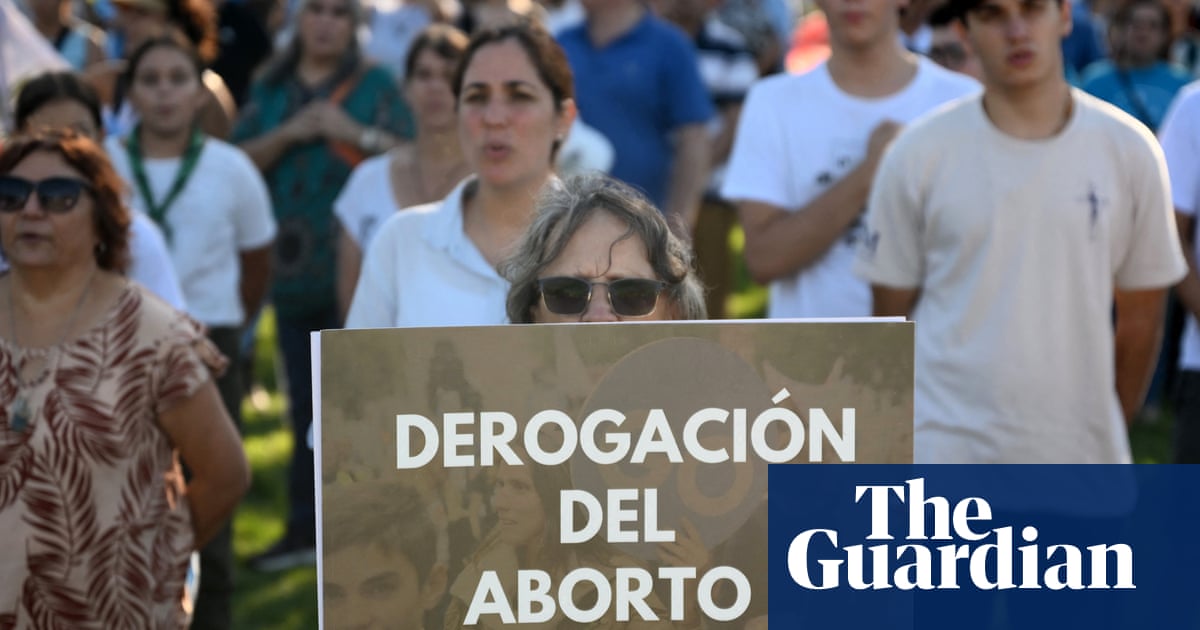Argentina is being used as a “testing ground” for stripping back abortion rights internationally as it cuts funding for contraceptives and ends the distribution of abortion pills,Amnesty Internationalwarned on Wednesday.
Before the inauguration of PresidentJavier Mileiin December 2023, the state bought abortion pills, which were then distributed for free through the public health system.
In 2023, the state supplied more than 166,000 doses of misoprostol and a joint mifepristone-misoprostol therapy known as a combipack, according to data collected by Amnesty. But it delivered none last year, with responsibility quietly handed over to the country’s 23 provinces.
Amnesty said the switch was “hindering access to abortion services for women”, and that more than half of the provinces reported a shortage of misoprostol, and almost all reported shortages of mifepristone and combipack.
According to the Argentine Network for Access to Safe Abortion, the change is having the biggest impact inprovinces where politicians are anti-abortionor have fewer economic resources.
Project Mirar, an initiative that monitors implementation of the abortion law, said provinces had struggled to negotiate prices as effectively as the state, and that some did not have the budget to buy the drugs. One report found that in some cases women had been forced tobuy the medication themselves, which it said could cost about $160 (£120).
Amnesty has warned that reproductive health policies being pushed by Argentina’s far-right government are linked toProject 25, the ultra-conservative policy blueprint being championed by the Trump administration in the US.
Mariela Belski, director of Amnesty InternationalArgentina, said she believed that “Argentina has been used as a testing ground for several of the policies featured in the Heritage Foundation’s 2025 plan”, including restricting access to abortion and limiting broader sexual and reproductive rights.
“It is part of a global backlash that seeks to dismantle hard-won gains secured by women. It is also happening under Donald Trump’s leadership in the United States and in countries such as Hungary,” said Belski.
Argentina legalised abortion in all cases up to 14 weeks of pregnancy in 2020, after sweeping protests known as the“green wave” movement. Previously, the procedure was permitted only in cases of rape or if the woman’s health was at risk.
The legalisation heralded a success for women’s rights in Argentina and regionally. Between 2021 and 2023,283,000 voluntary and legal abortionswere provided by Argentina’s public sector, whileabortion-related deaths more than halvedbetween 2020 and 2022.
But Milei has dismantled dozens of public policies relating to women’s rights since taking power. He hasclosed the ministry of women, genders and diversity, slashed programmes aimed atcombating gender violence, and drasticallycut funding for contraceptives.
The Argentinian leader told an audience ofhigh-school pupilsthat abortion should be considered “aggravated murder”, and declared to theWorld Economic Forumthat feminists were “promoters of the bloody, murderous abortion agenda”.
On the campaign trail, Milei said pro-choice Argentines were “brainwashed by a homicidal policy” and vowed to launch a referendum to overturn the abortion law.
In February 2024, a small group of legislators from Milei’s La Libertad Avanza party went further still, filing a bill in congressto repeal the landmark 2020 abortion law. The bill was quickly withdrawn, but in December a high-ranking member of the government said that apush to repeal or change the lawcould go ahead this year.
In Tucumán, a conservative province in north-west Argentina, healthcare providers say they are witnessing a rise in unsafe abortions amid supply delays and misinformation.
Adriana Alvarez, a gynaecologist who provides abortions at a public hospital in Tucumán, said supplies had repeatedly been disrupted over the past year.
“We’re now seeing, as we saw many years ago, unsafe abortions. They are being driven underground,” she said. “We’ve gone backwards.”
Amnesty said it had received 120 complaints from women requesting help and reporting being obstructed in trying to access abortions last year, up from 32 in 2023. Between January and April this year, Amnesty said it had received reports of 160 such cases.
Alvarez said women were arriving at the clinic with “fear in their eyes”. “They say they don’t want their family to find out, or to go to certain hospitals because people work there that they know,” she said.
“We have women who come and ask if they are still allowed to have an abortion,” she said. “They’re scared of going to jail.”
Those most affected are the poorest and most vulnerable women in society, with some susceptible to misinformation on social media, healthcare professionals warned.
Soledad Deza, a lawyer and president of Fundación Mujeres x Mujeres, which helps women access abortions, said the shift in official policy had confused women about the legality of abortion.
“There has been so much discourse around thinking of abortion as homicide that women do not know if they are exercising a right or committing a crime,” she said.
Milei’s anti-abortion rhetoric has also prompted growing numbers of doctors in Argentinato refuse to carry out terminations, according to medical professionals across the country.
Julieta Bazán, a doctor in Buenos Aires, said professionals – whether ultrasound staff, nurses or doctors – “no longer want to guarantee” abortion rights due to discrimination and a lack of resources. The “noticeable” abortion pill shortage was a “violation of our law”, she said.
